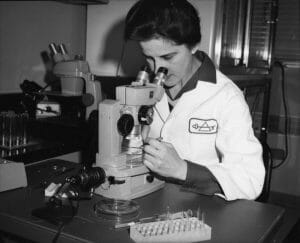Born in New York City, Mintz graduated magna cum laude from NYC’s Hunter College, but due to antisemitic admission quotas at east coast universities, she had to move to the University of Iowa to get her Master’s and PhD in biology. She was a professor of biological science at the University of Chicago from 1946 to 1960, with time off to pursue a Fulbright research fellowship at the Universities of Paris and Strasbourg in 1951. In 1960 she accepted a faculty position at the Institute for Cancer Research (now known as the Fox Chase Cancer Center), where she remained for the rest of her career, as well as teaching at the University of Pennsylvania.

Mintz made unprecedented discoveries in biology, including developmental genetics, gene-transfer technology, embryology, epigenetics, the development of cancer. A pioneer of genetic engineering techniques, she was able to develop mice that better helped researchers study how cancers developed, and what could prevent them. She allowed Rudolf Jaenisch to work in her lab for nine months, who was interested in why only certain types of cancer occurred when he injected mice with viruses. Inspired by Mintz’s earlier work, he wanted to know whether injecting viruses into early-stage embryos would result in the DNA being incorporated, and what types of cancer would occur. Using the techniques they developed, Mintz was able to establish the genetic basis of certain kinds of cancer and, in 1993, produced the first mouse model of human malignant melanoma, allowing for much more focused research on the deadly skin cancer.
Dr. Mintz received the first Genetics Society of America Medal (1981), the first March of Dimes Prize in Developmental Biology (shared with Ralph L. Brinster, 1996), and elected a Fellow of the American Academy of Arts and Sciences in 1982, and won the American Cancer Society National Medal of Honor for Basic Research (1997). Mintz “made foundational discoveries and revolutionized many tools and techniques of molecular biology that paved the way for tremendous progress in our understanding of cancer,” says Dr. Margaret Foti, CEO of the American Association for Cancer Research, which awarded Mintz its Lifetime Achievement in Cancer Research in 2012. Dr. Mintz died on January 3, three weeks before she would have turned 101.
